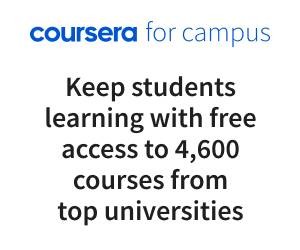As remote and digital learning becomes an intrinsic part of the university experience, institutions must improve their online offering
Giving an online presentation at Times Higher Education’s Student Success Forum 2020, Mike Damiano, director of Coursera for Campus, spoke to educators across Europe about what data can reveal about student satisfaction and skills.
Universities were rising to the challenges presented by Covid-19, he said, but student satisfaction surveys from across the sector suggested there was room for improvement. A recent survey of more than 40,000 higher and further education students by Jisc, for example, found that less than a quarter said their digital teaching was up to par.
"We can’t blame this on emergency teaching – 90 per cent of these responses were pre-Covid,” said Damiano. “If the sector wants to use data collection to increase satisfaction, it's really going to need to do a much better job,” he warned.
Responding to THE’s Student Success survey, university leaders said that “retention” was the most important factor in terms of the challenges faced in delivering student success. “[This] translates into the completion of courses, satisfaction with the learning experience itself, and ultimately employability,” he explained. “In other words...while higher education should not exist as a jobs factory, getting a start in the right career is clearly pretty important to learners.”
The current economic climate means that societies around the world now face “a tsunami of future skills development need,” said Damiano. Even before the pandemic, preparations for the fourth industrial revolution had given “plenty of warning about how jobs will simply disappear and be replaced by ones we don’t know about yet.”
Universities still present “the best opportunity” to address such challenges, he added, proposing three key strategies for university leaders going forward: “Number one, get much closer to understanding the individual skills that employers need. Two, create partnerships so that you can scale fast and deliver what's needed. Finally, mix it up. Give learners options on how to engage with you.”
With more than 68 million learners on the platform enrolled in around 4,000 courses, Coursera is uniquely placed to help with these strategies, he advised. “We've been hired by more than 2,800 businesses and governments to help train and upskill workforces...We learn what top employers want, we share these insights with universities and create courses that learners desire.”
“Online learning is absolutely here to stay...if we can give learners the best possible options to learn in the way they want, flexibly, at scale, we have to do that,” he said.
Watch the session above or on the Times Higher Education YouTube channel.











































































